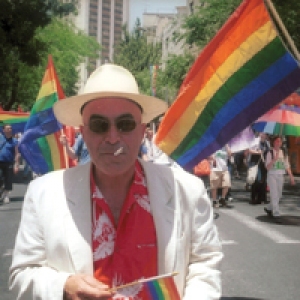 West
Bank, July 16, 2009 (Pal Telegraph): Ezra Nawi, an Israeli Jew who peacefully
protested against Jewish settlers and occupation forces in the West Bank is
set to be imprisoned.
West
Bank, July 16, 2009 (Pal Telegraph): Ezra Nawi, an Israeli Jew who peacefully
protested against Jewish settlers and occupation forces in the West Bank is
set to be imprisoned.Mr Nawi is due to be sentenced in court on August 16; without international intervention he could face years behind bars.
Ezra Nawi, 57, a plumber by trade, has also been a human rights activist for years in the area known as South Mt. Hebron. Nawi's persistent non-violent activity in the area is aimed both at aiding the local population in its plight to stay on their lands. But also at exposing the situation in the area to both the Israeli and international public eye. His presence has thwarted settlers and soldiers who view him with contempt. Army jeeps stalked him as he helped the locals.
The Palestinians, in this small desolate area in the very south of the West Bank, have been under Israeli occupation for almost 42 years; they still live without electricity, running water and other basic services, and are continuously harassed by the Jewish settlers who constantly violate both Israeli and International law. They are backed by a variety of Israeli military occupation forces, all of which operate in an effort to cleanse the area from its Palestinian inhabitants and create a new demographic reality in it.
The settlers, military occupation forces and Israeli police have a strong interest to restrict Ezra's movement and ban him from the area. He was pronounced guilty of assaulting a police officer who was demolishing a Palestinian house on July 22, 2007. Ezra and his supporters claim he has been falsely accused to get rid of him. He will be sentenced on August 16, 2009.
The demolition and the resistance to it were captured on film and broadcasted on Israeli news. As depicted on the film (which can be viewed on YouTube), Nawi, the man dressed in a green jacket, not only courageously protests the demolition, but after the bulldozer destroys the buildings he also tells the border policemen what he thinks of their actions. Sitting handcuffed in a military vehicle following his arrest, he exclaims:
"Yes, I was also a soldier, but I did not demolish houses ... The only thing that will be left here is hatred ..."
His arresting officers claim that the non-violent resister had assaulted them, although the claimed assault was not included in their original statements. The whole incident (barring the alleged assault) was caught on film, but the presiding judge believed the police. The sentencing was delayed because so many supporters turned up in court, some bearing a petition with 15,000 signatures.
Mr. Nawi is asking a bigger question of his countrymen: who is perpetrating the greater violence? Is it people like him, or is it a state which bulldozes Palestinian shacks while protecting the homes of South Hebron settlers which the rest of the world considers illegal.
Nawi has received threats on his life from the settlers in the past. The chief of the investigations in the Hebron Israeli Police once admitted that what Nawi is doing in the area is "exposing the dirt laying under the rug ..." Ezra Nawi's efforts have been fruitful in the sense that the attempt to cleanse the South Mt. Hebron from its Palestinian inhabitants has become a visible, internationally acknowledged issue.
Rebel Mr. Nawi, from an Iraqi Jewish family, attributes his activism to two things: as a teenager, his family lived next door to the leader of Israel's Communist Party, Reuven Kaminer, who influenced him. And he is gay.
"Being gay has made me understand what it is like to be a despised minority," Mr. Nawi said. Several years ago, he had a relationship with a Palestinian from the West Bank and ended up being convicted on charges of allowing his companion to live illegally in Israel. His companion was jailed for months.
His family do not understand his priorities and outspoken stance for the Palestinian's rights. His mother says she thinks he is wasting his time. "My mother gave birth to me in Jerusalem when she was 14," said Mr. Nawi, one of five siblings. "So my grandmother raised me. And she spoke to me in Arabic."
Also many Israelis, when told of his work, wonder why he is not helping his own. Mr. Nawi has an answer:
"I don't consider my work political," he said between phone calls as he drove. "I don't have a solution to this dispute. I just know that what is going on here is wrong. This is not about ideology. It is about decency."
For more information on how to help Ezra see www.supportezra.net and www.freeezra.org
Story from New York Times, Guardian and Support Ezra.net